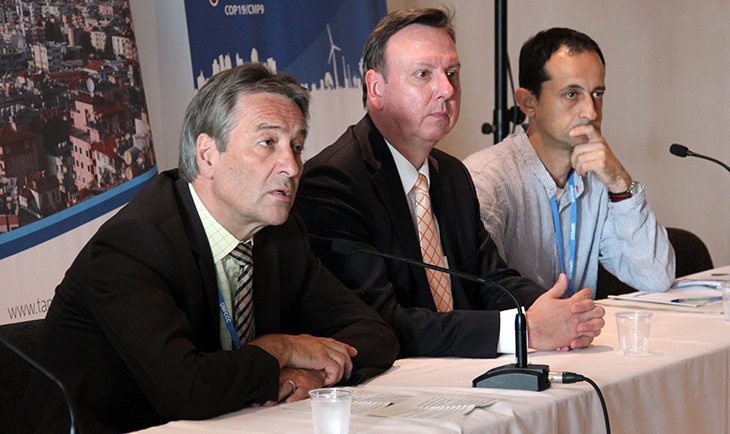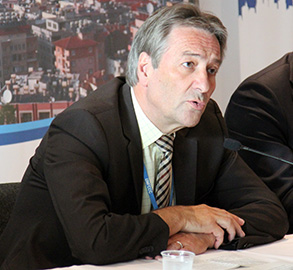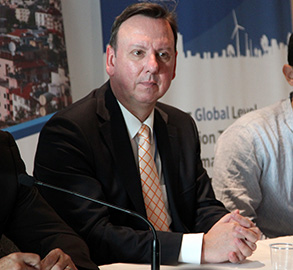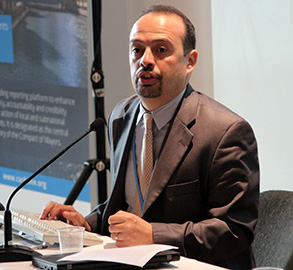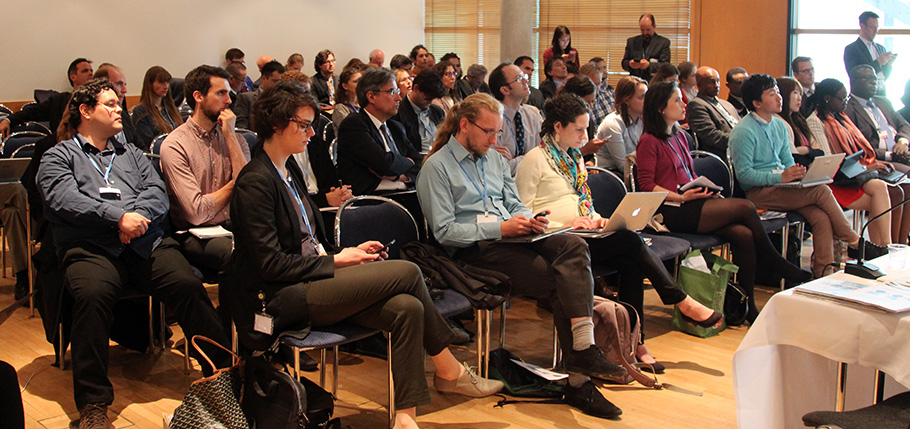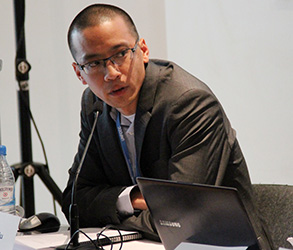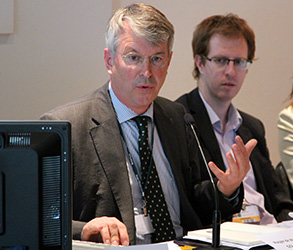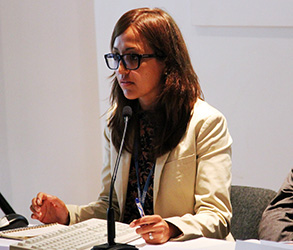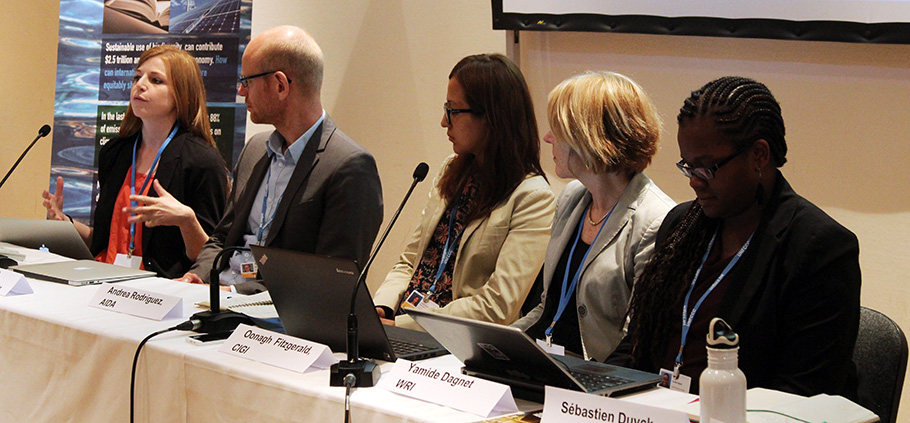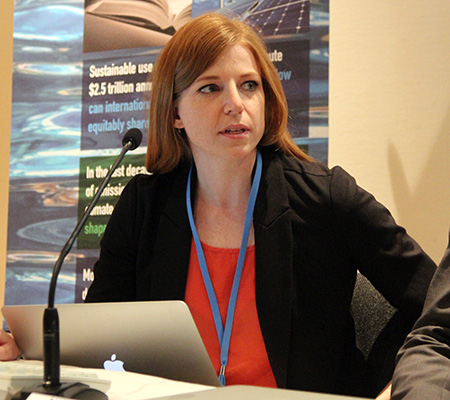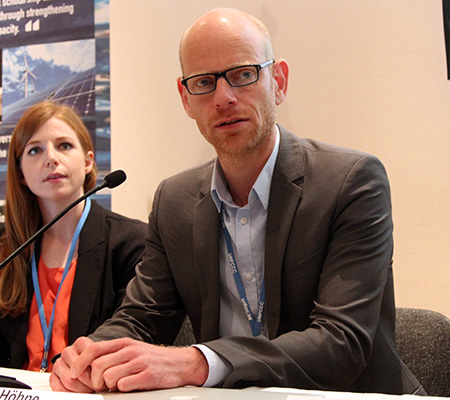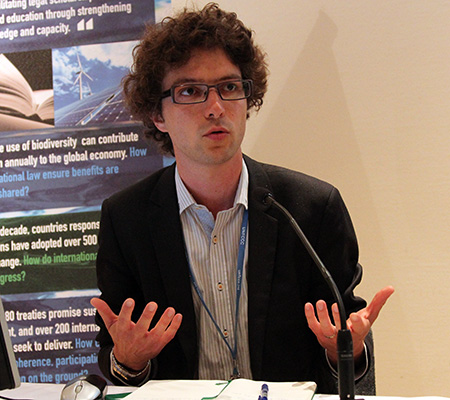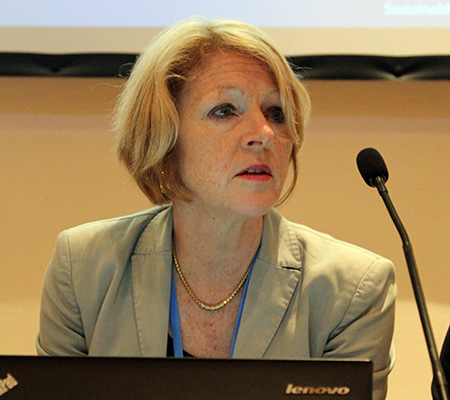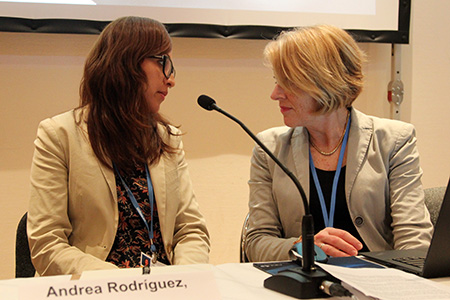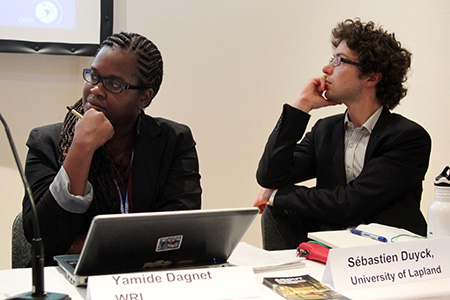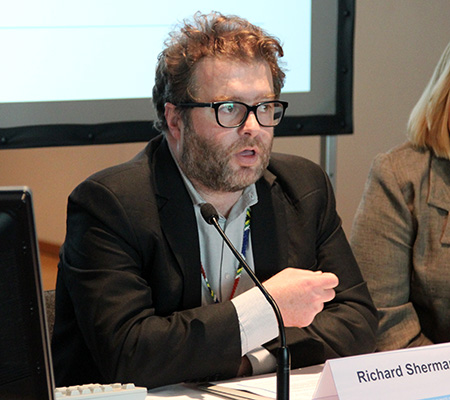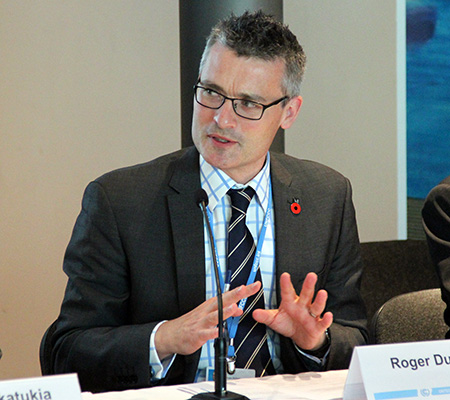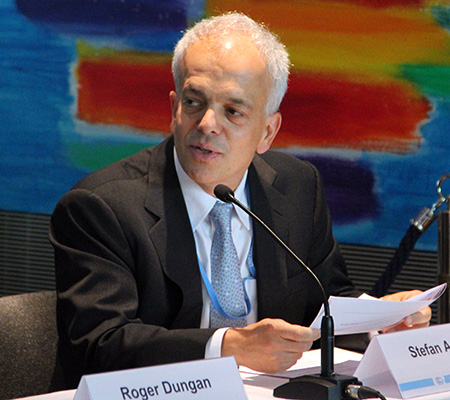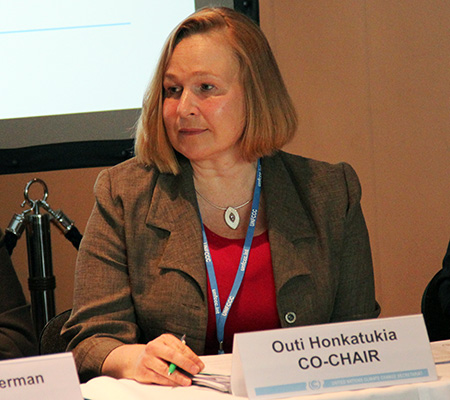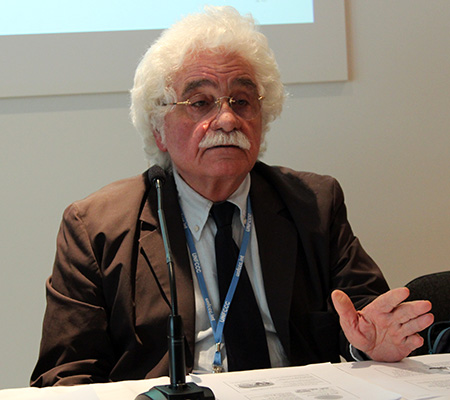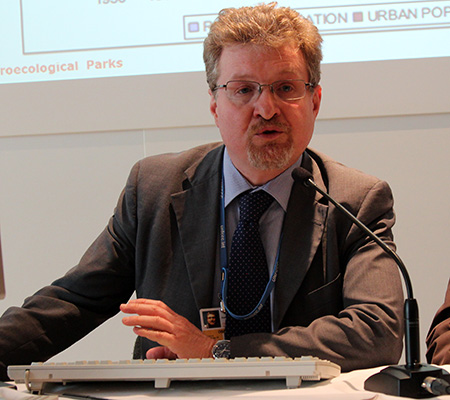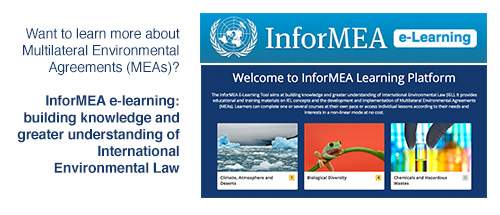Bonn Climate Change Conference - June 2015
1-11 June 2015 | Bonn, Germany
 |
 |
 |
Coverage of Selected Side Events at SBI 42, SBSTA 42 and ADP2-9
Highlights for Wednesday, 3 June 2015
Subscribe to our ENBOTS Reports |
||
|
Receive our ENBOTS bulletins and reports by email |
||

| Follow @IISDRS | ||

Loading... |
||
|
Receive emailed updates with the news articles above plus related information and announcements from our CLIMATE-L community mailing list: |
||

'L’Allumé', a steel sculpture by Mark di Suvero at the World Conference Center Bonn |
||
|
The following side events were covered by ENBOTS on Wednesday, 3 June 2015.
|
||
|
IISD Reporting Services, through its Earth Negotiations Bulletin on the Side (ENBOTS) Meeting Coverage, is providing daily digital coverage from selected side events at the Bonn Climate Change Conference - June 2015. | ||
Tapping the Potential of Local and Subnational Climate Action to Raise Pre-2020 Ambition and Beyond
Organized by ICLEI-Local Governments for Sustainability (ICLEI)
|
|
This session was facilitated by Yunus Arikan, ICLEI. In a video message, Ban Ki-moon, UN Secretary-General, called on participants to strengthen cities' networks, promote a successful agreement in Paris, and support a meaningful agenda at the Habitat III conference in 2016. In his opening remarks, Jürgen Nimptsch, Mayor, Bonn, highlighted 10 proposals to raise ambition in Paris including, among others, involving local governments in climate change planning; enhancing local cooperation and financial support; creating a work programme for local and regional actions; taking into account the multiple synergies that cut across climate change, sustainable development goals and financing for development; and inviting cities to join the Compact of Mayors. Arikan then gave an overview of the work of ICLEI towards COP 21, and highlighted proposed language on cities and local and sub-regional governments for inclusion in the Paris agreement. He noted that with or without progress at COP 21, the momentum of local and regional governments would still continue to grow under the banner of the Transformative Actions Programme (TAP). He described TAP as a tool to mobilize actors and educate them on relevant climate actions in order to promote ambitious, creative and inclusive projects in the lead up to and after 2020. Carlos Castillo, Basque Country and member of the Network for Regional Governments for Sustainable Development (nrg4SD), presented on the Basque Country Climate change strategy 2050, noting efforts at the local level to promote climate action through the implementation of both adaptation and mitigation measures. Dorah Nteo, Chief Sustainability Officer, Tshwane, South Africa, highlighted the scaling up of climate efforts in her local government, and commended various cities' networks for sharing best practices to enhance action in other cities. She stressed that for sustainability to take root, there is a need for private sector engagement. Antoine Faye, Chief Resiliency Officer, Dakar, Senegal, underlined that discussions on resilience cannot be had without including adaptation. He highlighted energy efficiency practices in his city, and drew attention to territorial energy and climate plans for every sector that promote energy efficiency and reductions in energy costs. Gino Van Begin, Secretary-General, ICLEI, underscored the need to mobilize cities to ensure the world maintains global temperatures below the predicted 2ºC in temperature rise. He highlighted ICLEI's Local Government Climate Roadmap, which: outlines progress in the climate regime and other negotiations pertaining to cities and local governments; suggests ways to close the ambition gap; and recommends 10 proposals to raise ambition in Paris. During the discussion, participants considered: methods to vertically integrate local actions with global ones; means to monitor and track progress in meeting commitments; and the implications of diversity across cities. | ||
|
|
||||
Green Climate Fund: How Can it Support Transformational Change?
Organized by Institute for Policy Studies (IPS) and
Asociación Interamericana para la Defensa del Ambiente (AIDA)
|
|
|
|
Moderated by Oscar Reyes, Institute for Policy Studies, this side event organized by IPS and AIDA discussed the various opportunities and challenges for the Green Climate Fund (GCF) to play a transformational role. | ||
|
||||
Opportunities to Strengthen Public Participation in the New Climate Governance Framework
Organized by the Centre for International Sustainable Development Law (CISDL),
University of Lapland, and the Centre for International Governance and Innovation (CIGI)
|
|
|
|
|
|
This event, chaired by Oonagh Fitzgerald, CIGI, discussed ways in which public participation can play a role in strengthening the Paris agreement, in relation to Intended Nationally Determined Contributions (INDCs) and measurement, reporting and verification (MRV) in particular. | ||
|
|
|
||||
Update on the work of the Standing Committee on Finance (SCF) in 2015
Organized by UNFCCC Secretariat
|
|
|
|
Co-Chair of the Standing Committee on Finance Outi Honkatukia opened the session, highlighting the mandate of the SCF and providing an overview of work undertaken thus far. She discussed the work of the SCF, inter alia: preparation of the arrangements between the Conference of the Parties (COP) and the Green Climate Fund (GCF); preparation of the 2014 biennial assessment and overview of climate finance flows; and organization of two SCF forums on mobilizing finance and investments for climate action now, and mobilizing adaptation finance. | ||
|
|
|
||||
Electrical Cities and Eco-productive and Agro-ecological Parks
Against Climate Change with Bio-Circular Economy
Organized by COBASE Basic Technical Scientific Cooperative
|
|
|
This session, moderated by Stefano Mannacio, COBASE, considered how to use high efficiency electricity to design new settlements, and achieve co-benefits such as the elimination of combustions, the development of a bio-circular economy and the creation of agro-ecological and eco-productive parks, in view of resources scarcity, against climate change and desertification and to protect biodiversity and well-being. Mannacio spoke on urban efficiency, biodiversity and traditional knowledge. Listing mitigation methods including green roofing and enhancing forestation in urban areas, he noted that mitigation is not enough and called for urban agriculture in vacant urban areas. He noted that this type of agriculture can preserve bioregional ecologies outside the city from being transformed into croplands and thus increase deforestation; and can be used as a tool to fight hunger and malnutrition in urban areas. Going beyond urban agriculture, he stressed the need to encourage agro-ecology which includes animal rearing, but does not allow for intensive agriculture, reiterating that the production of meat is not sustainable. Stressing that food consumption patterns are important for combating climate change, he noted the need to encourage vegetarianism. Mannacio then compared artificial ecology to natural ecology, describing the Amazon rainforest as the "most artificial environment in the world" as it was created by Indigenous Peoples who artificially fertilized farm fields by composting waste, which enhanced the biodiversity of the land. He stated that the Amazon is like a city, but with more sustainable consumption patterns. | ||
|
||||
|
The Earth Negotiations Bulletin on the side (ENBOTS) © <enb@iisd.org> is a special publication of the International Institute for Sustainable Development (IISD). This issue has been written by Rishikesh Ram Bhandary, Tallash Kantai and Gillian Nelson, Ph.D. The Digital Editor is Mike Muzurakis. The Editor is Dan Birchall <dan@iisd.org>. The Director of IISD Reporting Services is Langston James “Kimo” Goree VI <kimo@iisd.org>. Specific funding for coverage of side events through ENBOTS has been provided by the Kingdom of Saudi Arabia. The opinions expressed in ENBOTS are those of the authors and do not necessarily reflect the views of IISD and funders. Excerpts from ENBOTS may be used in non-commercial publications only with appropriate academic citation. For permission to use this material in commercial publications, contact the Director of IISD Reporting Services at <kimo@iisd.org>. Electronic versions of issues of ENBOTS from the Bonn Climate Change Conference - June 2015 can be found on the Linkages website at http://enb.iisd.org/climate/sb42/enbots/. The ENBOTS Team at the Bonn Climate Change Conference - June 2015 can be contacted by e-mail at <tallash@iisd.org>. | ||
has been provided by the Kingdom of Saudi Arabia and the European Union


IISD Reporting Services is grateful to the many donors of the Earth Negotiations Bulletin (ENB) and recognizes the following as core contributors to the ENB: the European Union, the Finnish Ministry for Foreign Affairs, the German Federal Ministry for the Environment, Nature Conservation, Building and Nuclear Safety (BMUB), the International Development Research Centre (IDRC), the Japanese Ministry of Environment (through the Institute for Global Environmental Strategies - IGES), the New Zealand Ministry of Foreign Affairs and Trade, the Kingdom of Saudi Arabia, SWAN International, Government of Switzerland (the Swiss Federal Office for the Environment (FOEN), the Swiss Agency for Development Cooperation (SDC), and the United Nations Environment Programme (UNEP). Funding for translation of the Bulletin into French is provided by the Government of France, the Wallonia, Québec, and the International Organization of La Francophonie/Institute for Sustainable Development of La Francophonie (IOF/IFDD).




